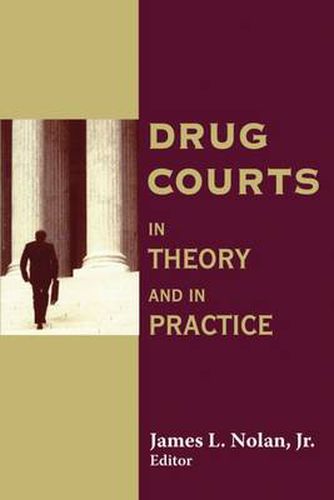Readings Newsletter
Become a Readings Member to make your shopping experience even easier.
Sign in or sign up for free!
You’re not far away from qualifying for FREE standard shipping within Australia
You’ve qualified for FREE standard shipping within Australia
The cart is loading…






The rapid expansion of the American drug court movement is by now a rather well-documented story. Practitioners, politicians, and academics alike acknowledge the profound impact that drug courts have had on the American criminal justice system. From a range of disciplinary perspectives, contributors to this volume seek to make sense of this important judicial innovation. Since the first drug court was initiated in 1989, more than 1,200 similar courts have been established or are in the planning and implementation stages throughout the United States. Mostly they offer low-level drug offenders a court-monitored treatment alternative to the normal adjudication process. Informed by a uniquely therapeutic judicial philosophy, drug courts depart considerably from the practices and procedures of a typical criminal court. Prosecutors and defense counsel, for example, play much reduced roles. Often lawyers are not even present during regular drug court sessions. Instead, the main courtroom drama is between judge and client, both of whom speak openly and freely in the drug court setting. Often accompanying the client is a treatment provider, who advises the judge and reviews the client’s progress in treatment. Court sessions are characterized by expressive, and sometimes tearful, testimonies about the recovery process, and are punctuated with applause from those in attendance. Once completing the program, clients participate in colorful graduation ceremonies, which involve emotional speeches from graduating clients, the issuing of graduation certificates, and visits from the media and other local luminaries. Building on his own earlier book on drug courts, this edited volume extends the scope of theoretical and empirical analyses in interesting and important ways. It investigates pertinent questions about punitive practices, civil rights, rehabilitative practices, cultural contexts, and competing institutional interests, all of them raised by the theory and practice of these courts. Assembled in the volume is the necessary range of scholars and practitioners prepared to address these questions. Contributors include five socio-logists, a law professor, a judge, two lawyers, a political theorist, and a criminologist. Though wide ranging with respect to the diversity of disciplinary approaches represented here, the volume maintains an analytical concentration on drug courts and on the important practical, philosophical, and jurisprudential consequences of this unique form of therapeutic jurisprudence. James L. Nolan, Jr., Williams College.
$9.00 standard shipping within Australia
FREE standard shipping within Australia for orders over $100.00
Express & International shipping calculated at checkout
The rapid expansion of the American drug court movement is by now a rather well-documented story. Practitioners, politicians, and academics alike acknowledge the profound impact that drug courts have had on the American criminal justice system. From a range of disciplinary perspectives, contributors to this volume seek to make sense of this important judicial innovation. Since the first drug court was initiated in 1989, more than 1,200 similar courts have been established or are in the planning and implementation stages throughout the United States. Mostly they offer low-level drug offenders a court-monitored treatment alternative to the normal adjudication process. Informed by a uniquely therapeutic judicial philosophy, drug courts depart considerably from the practices and procedures of a typical criminal court. Prosecutors and defense counsel, for example, play much reduced roles. Often lawyers are not even present during regular drug court sessions. Instead, the main courtroom drama is between judge and client, both of whom speak openly and freely in the drug court setting. Often accompanying the client is a treatment provider, who advises the judge and reviews the client’s progress in treatment. Court sessions are characterized by expressive, and sometimes tearful, testimonies about the recovery process, and are punctuated with applause from those in attendance. Once completing the program, clients participate in colorful graduation ceremonies, which involve emotional speeches from graduating clients, the issuing of graduation certificates, and visits from the media and other local luminaries. Building on his own earlier book on drug courts, this edited volume extends the scope of theoretical and empirical analyses in interesting and important ways. It investigates pertinent questions about punitive practices, civil rights, rehabilitative practices, cultural contexts, and competing institutional interests, all of them raised by the theory and practice of these courts. Assembled in the volume is the necessary range of scholars and practitioners prepared to address these questions. Contributors include five socio-logists, a law professor, a judge, two lawyers, a political theorist, and a criminologist. Though wide ranging with respect to the diversity of disciplinary approaches represented here, the volume maintains an analytical concentration on drug courts and on the important practical, philosophical, and jurisprudential consequences of this unique form of therapeutic jurisprudence. James L. Nolan, Jr., Williams College.